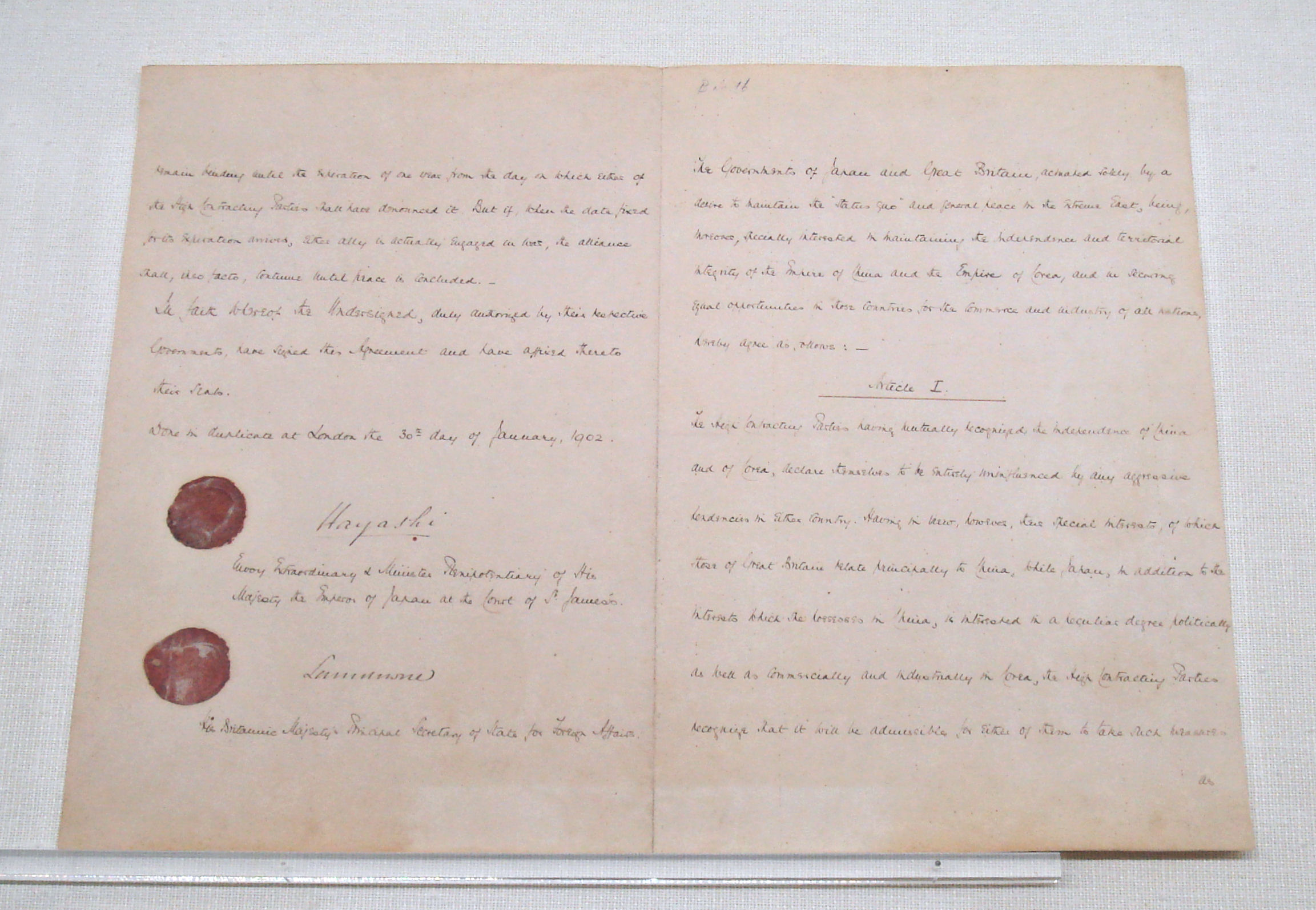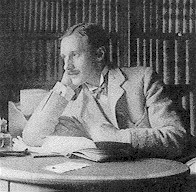|
Anglo-Japanese Alliance
The first was an alliance between Britain and Japan, signed in January 1902. The alliance was signed in London at Lansdowne House on 30 January 1902 by Lord Lansdowne, British Foreign Secretary, and Hayashi Tadasu, Japanese diplomat. A diplomatic milestone that saw an end to Britain's "Splendid isolation" (a policy of avoiding permanent alliances), the Anglo-Japanese alliance was renewed and expanded in scope twice, in 1905 and 1911, playing a major role in World War I before the alliance's demise in 1921 and termination in 1923. The main threat for both sides was from Russia. France was concerned about war with Britain and, in cooperation with Britain, abandoned its ally, Russia, to avoid the Russo-Japanese War of 1904. However, Britain siding with Japan angered the United States and some British dominions, whose opinion of the Empire of Japan worsened and gradually became hostile. Motivations and reservations The possibility of an alliance between Great Britain and Jap ... [...More Info...] [...Related Items...] OR: [Wikipedia] [Google] [Baidu] |
Anglo Japanese Alliance 30 January 1902
Anglo is a prefix indicating a relation to, or descent from, the Angles, England, English culture, the English people or the English language, such as in the term ''Anglosphere''. It is often used alone, somewhat loosely, to refer to people of British people, British descent in Anglo-America, the Anglo-Caribbean, Anglophone Caribbean, South Africa, Namibia, Australia, and New Zealand. It is used in Canada to differentiate between the French speakers (Francophone) of mainly Quebec and some parts of New Brunswick, and the English speakers (Anglophone) in the rest of Canada. It is also used in the United States to distinguish the Hispanic and Latino Americans, Latino population from the non-Latino white majority. Anglo is a Late Latin Prefix (linguistics), prefix used to denote ''English-'' in conjunction with another toponym or demonym. The word is Etymology, derived from Anglia, the Latin name for England and still used in the modern name for its eastern region, East Anglia. ... [...More Info...] [...Related Items...] OR: [Wikipedia] [Google] [Baidu] |
The Times
''The Times'' is a British daily national newspaper based in London. It began in 1785 under the title ''The Daily Universal Register'', adopting its current name on 1 January 1788. ''The Times'' and its sister paper ''The Sunday Times'' (founded in 1821) are published by Times Newspapers, since 1981 a subsidiary of News UK, in turn wholly owned by News Corp. ''The Times'' and ''The Sunday Times'', which do not share editorial staff, were founded independently and have only had common ownership since 1966. In general, the political position of ''The Times'' is considered to be centre-right. ''The Times'' is the first newspaper to have borne that name, lending it to numerous other papers around the world, such as ''The Times of India'', ''The New York Times'', and more recently, digital-first publications such as TheTimesBlog.com (Since 2017). In countries where these other titles are popular, the newspaper is often referred to as , or as , although the newspaper is of nationa ... [...More Info...] [...Related Items...] OR: [Wikipedia] [Google] [Baidu] |
Anglo-Russian Convention
The Anglo-Russian Convention of 1907 (russian: Англо-Русская Конвенция 1907 г., translit=Anglo-Russkaya Konventsiya 1907 g.), or Convention between the United Kingdom and Russia relating to Persia, Afghanistan, and Tibet (; ), was signed on August 31, 1907, in Saint Petersburg. It ended the longstanding rivalry in Central Asia and enabled the two countries to outflank the Germans, who were threatening to connect Berlin to Baghdad with a new railroad that could potentially align the Ottoman Empire with Imperial Germany. The Convention ended the long dispute over Persia. Great Britain promised to stay out of northern Persia, and Russia recognized southern Persia as part of the British sphere of influence. Russia also promised to stay out of Tibet and Afghanistan. In exchange, London extended loans and some political support. The convention brought shaky British–Russian relations to the forefront by solidifying boundaries that identified respective control i ... [...More Info...] [...Related Items...] OR: [Wikipedia] [Google] [Baidu] |
Entente Cordiale
The Entente Cordiale (; ) comprised a series of agreements signed on 8 April 1904 between the United Kingdom and the French Republic which saw a significant improvement in Anglo-French relations. Beyond the immediate concerns of colonial demarcation addressed by the agreement, the signing of the Entente Cordiale marked the end of almost a thousand years of intermittent conflict between the two states and their predecessors, and replaced the ''modus vivendi'' that had existed since the end of the Napoleonic Wars in 1815 with a more formal agreement. The Entente Cordiale represented the culmination of the policy of Théophile Delcassé (France's foreign minister from 1898 to 1905), who believed that a Franco-British understanding would give France some security in Western Europe against any German system of alliances (see Triple Alliance (1882)). Credit for the success of the negotiation of the Entente Cordiale belongs chiefly to Paul Cambon (France's ambassador in London ... [...More Info...] [...Related Items...] OR: [Wikipedia] [Google] [Baidu] |
Prime Minister Of Japan
The prime minister of Japan (Japanese: 内閣総理大臣, Hepburn: ''Naikaku Sōri-Daijin'') is the head of government of Japan. The prime minister chairs the Cabinet of Japan and has the ability to select and dismiss its Ministers of State. The prime minister also serves as the civilian commander-in-chief of the Japan Self Defence Forces and as a sitting member of the House of Representatives. The individual is appointed by the emperor of Japan after being nominated by the National Diet and must retain the nomination of the lower house and answer to parliament to remain in office. The position and nature of this title allow the holder to reside in and work at the Prime Minister's Official Residence in Nagatacho, Chiyoda, Tokyo, close to the National Diet Building. Fumio Kishida is the current prime minister of Japan, replacing Yoshihide Suga on 4 October 2021. As of , there have been 102 prime ministers. Designation Abbreviations In Japanese, due to the special ... [...More Info...] [...Related Items...] OR: [Wikipedia] [Google] [Baidu] |
Qing Dynasty
The Qing dynasty ( ), officially the Great Qing,, was a Manchu-led imperial dynasty of China and the last orthodox dynasty in Chinese history. It emerged from the Later Jin dynasty founded by the Jianzhou Jurchens, a Tungusic-speaking ethnic group who unified other Jurchen tribes to form a new "Manchu" ethnic identity. The dynasty was officially proclaimed in 1636 in Manchuria (modern-day Northeast China and Outer Manchuria). It seized control of Beijing in 1644, then later expanded its rule over the whole of China proper and Taiwan, and finally expanded into Inner Asia. The dynasty lasted until 1912 when it was overthrown in the Xinhai Revolution. In orthodox Chinese historiography, the Qing dynasty was preceded by the Ming dynasty and succeeded by the Republic of China. The multiethnic Qing dynasty lasted for almost three centuries and assembled the territorial base for modern China. It was the largest imperial dynasty in the history of China and in 1790 the f ... [...More Info...] [...Related Items...] OR: [Wikipedia] [Google] [Baidu] |
Cecil Spring Rice
Sir Cecil Arthur Spring Rice, (27 February 1859 – 14 February 1918) was a British diplomat who served as British Ambassador to the United States from 1912 to 1918, as which he was responsible for the organisation of British efforts to end American neutrality during the First World War. He was also a close friend of US President Theodore Roosevelt, and served as best man at his second wedding.Roosevelt's Contemporaries: Cecil Spring Rice , Theodore Roosevelt Center (7 April 2014). Retrieved 28 July 2016. He is best known as the writer of the lyrics of the patriotic hymn, " |
Russian Invasion Of Manchuria
The Russian invasion of Manchuria occurred in the aftermath of the First Sino-Japanese War (1894–1895) when concerns regarding Qing dynasty, Qing China's defeat by the Empire of Japan, and Japan's brief occupation of Liaodong Peninsula, Liaodong, caused the Russian Empire to speed up their long held designs for Russian Colonialism, imperial expansion across Eurasia. In the five years preceding the invasion, the Russian Empire established a network of leased territories in Manchuria. This began with the Triple Intervention in 1895, in which Russia received Convention for the Lease of the Liaotung Peninsula, Liaotung from Japan. From 1897 Russia obtained from the Qing government leased territory to build and operate the Chinese Eastern Railway (CER). As with all other major powers in China, Russia demanded Concessions in China, concessions along with the railroad, enforced through Unequal treaty, unequal treaties. With the building of a southern branch of the CER (later t ... [...More Info...] [...Related Items...] OR: [Wikipedia] [Google] [Baidu] |
Anglo-Japanese Treaty Of Commerce And Navigation
The signed by Britain and Japan, on 16 July 1894, was a breakthrough agreement; it heralded the end of the unequal treaties and the system of extraterritoriality in Japan. The treaty came into force on 17 July 1899. From that date British subjects in Japan were subject to Japanese laws instead of British laws. The jurisdiction of the British Supreme Court for China and Japan, the British Court for Japan under it and consular courts in each treaty port ceased on that date, save for pending cases which were allowed to continue. British subjects from that date became subject to the jurisdiction of Japanese courts. Background In February 1853 Russia discovered that a US fleet led by Commodore Matthew Perry was to leave Norfolk for Japan. Tsar Alexander II then organized an expedition and entrusted its command to Admiral Yevfimiy Putyatin. The Russian delegation arrived in Nagasaki on 12 August 1853, a month after the Americans, and began a series of negotiations that would lea ... [...More Info...] [...Related Items...] OR: [Wikipedia] [Google] [Baidu] |
Yomiuri Shimbun
The (lit. ''Reading-selling Newspaper'' or ''Selling by Reading Newspaper'') is a Japanese newspaper published in Tokyo, Osaka, Fukuoka, and other major Japanese cities. It is one of the five major newspapers in Japan; the other four are the ''Asahi Shimbun'', the ''Chunichi Shimbun (Tokyo Shimbun)'' the ''Mainichi Shimbun'', and the '' Nihon Keizai Shimbun''. It is headquartered in Otemachi, Chiyoda, Tokyo.' It is a newspaper that represents Tokyo and generally has a conservative orientation. It is one of Japan's leading newspapers, along with the Osaka-based liberal (Third way) Asahi Shimbun and the Nagoya-based Social democratic Chunichi Shimbun. It is published by regional bureaus, all of them subsidiaries of The Yomiuri Shimbun Holdings, Japan's largest media conglomerate by revenue and the second largest media conglomerate by size behind Sony,The Yomiuri Shimbun Holdings is the largest media conglomerate by revenue in Japan, while Sony is Japan's largest media con ... [...More Info...] [...Related Items...] OR: [Wikipedia] [Google] [Baidu] |
Mainichi Shimbun
The is one of the major newspapers in Japan, published by In addition to the ''Mainichi Shimbun'', which is printed twice a day in several local editions, Mainichi also operates an English language news website called ''The Mainichi'' (previously ''Mainichi Daily News''), and publishes a bilingual news magazine, ''Mainichi Weekly''. It also publishes paperbacks, books and other magazines, including a weekly news magazine, ''Sunday Mainichi''. It is one of the four national newspapers in Japan; the other three are the ''Asahi Shimbun'', the ''Yomiuri Shimbun'' and the '' Nihon Keizai Shimbun''. The Sankei Shimbun and The ''Chunichi Shimbun'' are not currently in the position of a national newspaper despite a large circulation for the both respectively. History The history of the ''Mainichi Shinbun'' began with the founding of two papers during the Meiji period. The ''Tokyo Nichi Nichi Shimbun'' was founded first, in 1872. The ''Mainichi'' claims that it is the oldest existing ... [...More Info...] [...Related Items...] OR: [Wikipedia] [Google] [Baidu] |







